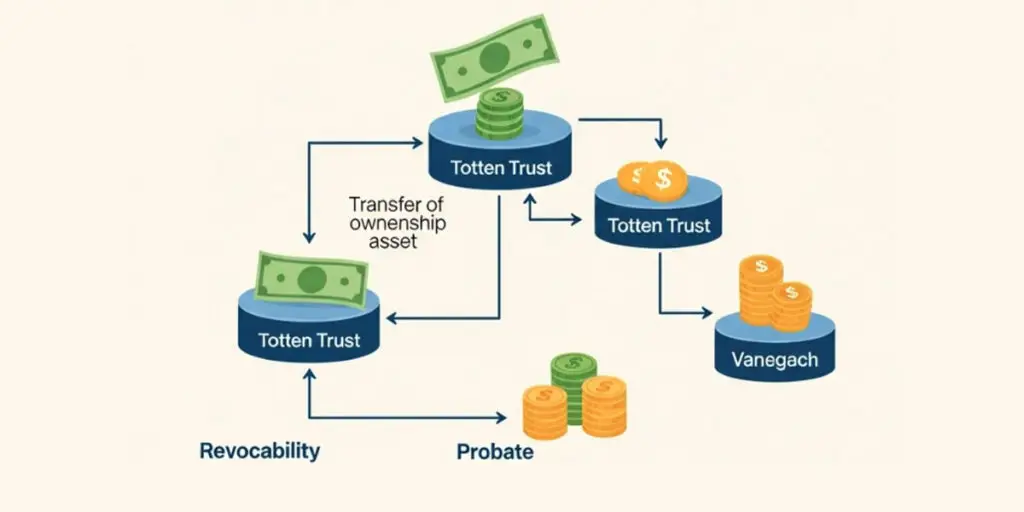What Is a Totten Trust? An Expert Guide for New Yorkers
In the world of estate planning, individuals often seek straightforward methods to transfer assets to loved ones, hoping to avoid the complexities and costs of probate. You may have a savings account that you want to go directly to a child or grandchild upon your passing, without the need for a formal, intricate legal document. This common desire leads many New Yorkers to a powerful yet simple tool: the Totten trust.
A Totten trust is one of the most accessible estate planning instruments available, but its simplicity can be misleading. While it offers significant benefits, it also comes with critical limitations that every New Yorker should understand. As an experienced estate planning lawyer, I have seen these accounts used effectively and, unfortunately, in ways that create unintended problems. This comprehensive guide will demystify the Totten trust, exploring its function, legal basis in New York, and its proper role within a larger financial strategy.
Understanding the Fundamentals of a Totten Trust
At its core, a Totten trust is a straightforward way to designate a beneficiary for a bank account. It is not a complex document drafted by an attorney but rather a feature offered by most financial institutions. Understanding its structure and terminology is the first step toward using it wisely.
What Exactly Is a Totten Trust?
A Totten trust is a type of revocable trust created during a person’s lifetime, where a bank account is titled in the name of the depositor “in trust for” a named beneficiary. It is often referred to as a Payable-on-Death (POD) account. The key feature is its tentative nature; the depositor retains complete control over the funds throughout their life. Upon the depositor’s death, any remaining funds in the account automatically pass directly to the beneficiary, bypassing the probate process entirely.
This mechanism was established in a landmark New York case, *Matter of Totten*, which recognized it as a “tentative trust.” Essentially, it remains a mere possibility until the depositor’s death solidifies the beneficiary’s right to the funds. This simplicity makes it an attractive option for those looking for an efficient way to transfer cash assets. The team at Morgan Legal Group frequently advises clients on how these accounts can complement their broader wills and trusts.
Key Terminology You Need to Know
To fully grasp how a Totten trust operates, it’s essential to understand the roles of the parties involved. While the concept is simple, the legal terms provide clarity on the rights and responsibilities of each individual.
- Depositor (or Grantor/Settlor): This is the individual who opens the bank account, deposits the funds, and names the beneficiary. In the context of a Totten trust, the depositor is the creator of the trust.
- Trustee: Uniquely, the depositor also acts as the trustee during their lifetime. This means they have a fiduciary duty to manage the account, but since they are also the sole lifetime beneficiary, they have complete freedom to use the funds as they see fit.
- Beneficiary: This is the person or entity designated to receive the funds in the account upon the depositor’s death. Importantly, the beneficiary has no rights to the money while the depositor is alive.
- Trust Property (or Corpus): This refers to the assets held within the trust—in this case, the funds in the specific bank account.
Understanding these roles is crucial, especially when considering how a Totten trust interacts with other legal documents, such as a will or a power of attorney. Our attorneys can help clarify these distinctions during a consultation.
How a Totten Trust Works in Practice: A Step-by-Step Guide
Creating and managing a Totten trust is a refreshingly simple process, which is a primary reason for its popularity. Here’s a practical breakdown of how it works from creation to payout.
- Opening the Account: The depositor goes to a bank or credit union and requests to open an account “in trust for” (ITF) a specific person. For example, “Jane Doe in trust for John Doe.” The bank will require the beneficiary’s basic information, such as their name and date of birth, but the beneficiary’s signature or even their knowledge of the account is not required.
- During the Depositor’s Lifetime: Once established, the account functions like any other personal bank account for the depositor. They can deposit more money, withdraw funds for any reason, or even close the account entirely. They also have the right to change the beneficiary at any time by simply filling out a new form at the bank. The beneficiary has zero access or control.
- Upon the Depositor’s Death: When the depositor passes away, the trust becomes irrevocable. The beneficiary can claim the funds by presenting proof of identity and a certified copy of the depositor’s death certificate to the bank. The bank then transfers ownership of the account balance directly to the beneficiary. This transfer happens outside the probate court system, making it fast and private.
The Legal Foundation of Totten Trusts in New York
The Totten trust is not just a banking product; it is a legal concept deeply rooted in New York case law and codified in state statutes. Understanding its legal underpinnings is vital for anyone considering this tool as part of their estate plan. The attorneys at Morgan Legal Group, led by Russel Morgan, Esq., have extensive experience navigating these specific New York laws.
The Landmark Case: *Matter of Totten*
The entire concept owes its name and existence to the 1904 New York Court of Appeals decision in *Matter of Totten*. In this case, the court was faced with determining the legal status of a savings account opened by an individual “in trust for” another. The court’s innovative ruling established the “tentative trust” doctrine.
The court concluded that such a deposit creates a tentative trust that is revocable at will by the depositor at any time before their death. If the depositor dies before the beneficiary without having revoked the trust, a presumption arises that an absolute trust was created for the balance on hand at the time of death. This historic decision struck a balance, giving depositors lifetime control while allowing for a simple, non-probate transfer at death. This principle remains the foundation of Totten trust law in New York today.
New York Estates, Powers and Trusts Law (EPTL) § 7-5
While *Matter of Totten* created the common law principle, the New York State Legislature later codified and clarified the rules in Article 7, Part 5 of the Estates, Powers and Trusts Law (EPTL). This statute provides a clear legal framework for banks, depositors, and beneficiaries.
EPTL § 7-5.2: Terms of a Trust Account
This section formally defines a Totten trust account and outlines how it can be revoked. It states that the trust is revocable by the depositor’s actions during their lifetime, such as withdrawing all the funds. Critically, it also specifies that a Totten trust can be revoked or modified by the depositor’s will, but only if the will explicitly names the financial institution and the beneficiary and makes a clear statement of revocation or amendment. A general statement like “I bequeath all my property to my son” is not enough to revoke a Totten trust naming a daughter as the beneficiary. This level of specificity is something an experienced estate planning attorney can ensure is correctly drafted.
EPTL § 7-5.3 & 7-5.4: Payment and Bank Protection
These sections provide crucial protections for financial institutions. They state that if a bank pays the funds to the named beneficiary upon the depositor’s death, the bank is fully discharged from all liability. This is true even if the depositor’s will actually revoked the trust, unless the bank received written notice of the will’s provision *before* making the payment. This rule encourages swift payment to beneficiaries and places the responsibility on the estate’s executor to notify the bank promptly.
Differentiating Totten Trusts from Other Estate Planning Tools
A Totten trust is just one tool in a vast estate planning toolkit. To use it effectively, one must understand how it compares to other common instruments.
Totten Trust vs. Joint Bank Account
A joint account with rights of survivorship also avoids probate, but it operates very differently. In a joint account, both owners have equal rights to the funds during their lifetimes. One owner could legally withdraw the entire balance without the other’s consent. In a Totten trust, only the depositor has access. At death, a joint owner immediately owns the entire account, whereas a Totten trust beneficiary’s rights only begin at the depositor’s death. This distinction is critical for control and asset protection.
Totten Trust vs. Formal Revocable Living Trust
A formal revocable living trust is a much more comprehensive and powerful document. While a Totten trust can only manage a single bank account, a formal trust can hold a wide variety of assets, including real estate, investment portfolios, and business interests. Furthermore, a formal trust provides detailed instructions for managing assets during incapacity, not just after death. It can also include sophisticated provisions for asset protection for beneficiaries, tax planning, and managing distributions over time. A Totten trust is a simple tool for a simple purpose; a formal trust is a robust solution for more complex estates.
Totten Trust vs. Last Will and Testament
A Last Will and Testament is the cornerstone of most estate plans. It directs the distribution of assets that are in your name alone at the time of your death—assets that must go through probate. A Totten trust, by contrast, is a non-probate device. The funds pass directly to the beneficiary by operation of law, independent of the will. However, a will is still necessary to name an executor, appoint a guardian for minor children, and dispose of all other assets that are not transferred via a trust or beneficiary designation. Relying solely on Totten trusts without a will is a common but serious probate and estate planning mistake.
The Major Advantages of Using a Totten Trust
The enduring popularity of the Totten trust stems from several significant advantages that appeal to individuals across New York City and beyond. These benefits center on simplicity, cost-effectiveness, and control.
Simplicity and Ease of Creation
Perhaps the most compelling advantage is its sheer simplicity. Creating a Totten trust does not require hiring an attorney or drafting complex legal documents. It can be established in minutes at any bank or credit union by filling out a simple form. This accessibility empowers individuals to take a basic estate planning step without significant expense or delay, making it an excellent entry-level tool for managing a portion of one’s assets.
Probate Avoidance: The Primary Benefit
The main strategic reason for using a Totten trust is to avoid probate. The probate process in New York is the court-supervised procedure for validating a will, appointing an executor, paying debts, and distributing assets. This process can be:
- Time-Consuming: It can take many months, or even years in complex cases, for beneficiaries to receive their inheritance.
- Costly: Probate involves court filing fees, executor commissions, and attorney’s fees, all of which are paid from the estate’s assets.
- Public: The will and a list of the estate’s assets become public records, accessible to anyone.
Because Totten trust funds pass directly to the beneficiary, they are not part of the probate estate. This means the beneficiary can access the money almost immediately after providing the necessary paperwork to the bank, saving significant time, money, and preserving the family’s privacy. For help navigating the probate process for other assets, our probate lawyers are always available.
Retained Control and Flexibility
Unlike an irrevocable gift, a Totten trust offers complete flexibility. The depositor is the sole owner and controller of the funds during their lifetime. If a financial emergency arises, the money is there to be used. If the relationship with the beneficiary changes, the designation can be switched to someone else with a simple trip to the bank. You can even decide you no longer want the trust and close the account, withdrawing the funds. This level of control provides immense peace of mind, as you are not permanently locking your assets away.
Enhanced Privacy
For many families, financial privacy is a major concern. Because assets passing through a will become part of the public probate record, anyone can learn the details of your estate. Totten trusts, along with other non-probate transfers like living trusts and beneficiary designations on retirement accounts, keep the transfer of wealth private. The transaction occurs directly between the beneficiary and the bank, away from public scrutiny. This is a significant benefit for those who prefer to keep their financial affairs confidential.
Potential Drawbacks and Limitations of Totten Trusts
While Totten trusts are useful, they are far from a perfect solution for every situation. An experienced estate planning lawyer will always highlight the potential downsides. Overlooking these limitations can lead to serious, unintended consequences for your estate and your loved ones.
Not a Substitute for a Comprehensive Estate Plan
The most critical limitation is its narrow scope. A Totten trust can only control the distribution of funds in a single bank account. It does nothing for your real estate, stocks, vehicles, personal property, or other financial accounts. Relying solely on Totten trusts creates a fragmented, incomplete plan. A comprehensive estate plan, which typically includes a will and potentially a living trust, is essential to manage all of your assets, name guardians for children, and address your overall wishes in a coordinated manner.
Vulnerability to Creditor Claims and Spousal Rights
Avoiding probate does not mean avoiding creditors. Under New York law, funds in a Totten trust are still considered part of the decedent’s estate for the purpose of paying debts. If the probate estate lacks sufficient assets to cover funeral expenses, taxes, and other creditor claims, the estate’s executor can legally pull funds back from the Totten trust beneficiary to satisfy these obligations.
Furthermore, and critically, Totten trust assets are subject to the New York surviving spouse’s “right of election.” This law prevents you from disinheriting a spouse. A surviving spouse is entitled to claim an “elective share” of the deceased spouse’s “net estate”—which includes Totten trust accounts. The elective share is the greater of $50,000 or one-third of the net estate. Therefore, even if you name your child as the beneficiary of a large Totten trust, your surviving spouse may have a legal right to a portion of those funds. This is a complex area of elder law and estate law where professional legal advice is indispensable.
Lack of Incapacity Planning
A Totten trust only functions upon your death. It provides no mechanism for managing the funds if you become incapacitated and unable to handle your own financial affairs. If you suffer a stroke or develop dementia, no one—not even the named beneficiary—can legally access the account to pay for your care. In such a scenario, your family might be forced to initiate a costly and intrusive court proceeding to have a guardian appointed. A well-drafted Durable Power of Attorney and a funded Revocable Living Trust are the proper tools for incapacity planning.
Potential for Unintended Consequences
Simplicity can sometimes lead to oversight. For instance, what happens if the beneficiary you named dies before you do? Under New York law (EPTL § 7-5.2(3)), if the beneficiary predeceases the depositor, the trust is automatically revoked, and the account reverts to being the depositor’s individual property. Upon the depositor’s death, these funds would then pass through their probate estate according to their will, or to their heirs if they have no will. This might not be the outcome the depositor wanted. A formal trust, by contrast, allows you to name contingent beneficiaries.
No Asset Protection for Beneficiaries
When a beneficiary inherits funds from a Totten trust, they receive the money outright. It becomes their personal property, fully exposed to their own financial risks. The money is not shielded from the beneficiary’s future creditors, a divorce settlement, or lawsuits. If your goal is to provide long-term protection for an heir who may not be good with money or who is in a risky profession, a formal trust with “spendthrift” provisions is a much more effective tool. A skilled estate planning attorney can structure a trust to protect assets for generations.
Advanced Topics and Nuances in New York Totten Trust Law
To truly leverage a Totten trust effectively and avoid its pitfalls, a deeper understanding of its legal nuances under New York law is required. These advanced topics illustrate why consulting with a legal professional is often a wise decision, even for a seemingly simple tool.
Methods for Revoking a Totten Trust
While the depositor’s control is a key feature, it’s important to know exactly how a Totten trust can be legally revoked. There are several methods recognized under New York’s EPTL § 7-5.2.
- Withdrawal or Closure: The most direct method is to withdraw all the funds from the account or to formally close it. This action unequivocally terminates the trust.
- Written Notice to the Bank: The depositor can change or remove the beneficiary at any time by providing written instructions to the financial institution.
- Revocation by Will: This is a commonly misunderstood area. A Totten trust can be revoked in a will, but New York law sets a very high bar. The will must contain a provision that specifically identifies the beneficiary and the financial institution. A general statement disposing of all bank accounts is insufficient. For example, the will must state something like: “I hereby revoke the trust account #12345 held at ABC Bank in trust for my son, John Doe.” Without this level of specificity, the trust will remain effective, and the funds will pass to the beneficiary, potentially contrary to the testator’s final wishes.
- Automatic Revocation by Divorce: Under EPTL § 5-1.4, if you name your spouse as a beneficiary and later get divorced, the designation is automatically revoked by operation of law unless the divorce decree or a prenuptial agreement states otherwise.
Totten Trusts and Medicaid Planning
For those engaged in elder law planning to qualify for Medicaid for long-term care, a Totten trust offers no asset protection. Because the depositor retains full access and control over the funds, Medicaid considers the entire account balance to be a countable resource belonging to the applicant. The funds must be spent down before the individual can become eligible for Medicaid benefits. This stands in stark contrast to a properly structured Medicaid Asset Protection Trust (an irrevocable trust), which is designed to shield assets after the five-year look-back period. Misunderstanding this distinction can lead to a denial of crucial long-term care benefits.
The Beneficiary’s Status During the Depositor’s Life
It is critical to reiterate that a Totten trust beneficiary has no vested rights whatsoever while the depositor is alive and competent. Their interest is merely an expectancy, a hope of receiving the funds in the future. The beneficiary cannot:
- Access or withdraw funds from the account.
- Use the account as collateral for a loan.
- Prevent the depositor from spending the money or changing the beneficiary.
This absolute control by the depositor is a defining characteristic of the Totten trust structure.
Complications When the Beneficiary Is a Minor
Naming a minor as a beneficiary of a Totten trust can create significant complications that undermine the goal of simplicity. While the transfer avoids probate, banks are justifiably reluctant to turn over a large sum of money directly to a child. The bank will likely require that a legal guardian of the property for the minor be appointed by a court.
This means the family will have to go to Surrogate’s Court to initiate a guardianship proceeding—the very type of court involvement the Totten trust was meant to avoid. A far better approach for leaving money to a minor is to use a Custodial Account under the Uniform Transfers to Minors Act (UTMA) or to create a formal trust within your will (a testamentary trust) that appoints a trustee to manage the funds until the child reaches a designated age. Our family law and estate planning experts can guide you on the best way to provide for minor children.
Practical Scenarios: Is a Totten Trust Right for You?
Understanding the theory is one thing; applying it to real-life situations is another. A Totten trust is an excellent tool in certain circumstances but a poor choice in others. Let’s explore some common scenarios to see where it fits.
Scenario 1: A Simple Gift to an Adult Child
Imagine Maria, a widow in Brooklyn, has a comprehensive will that divides her main assets equally among her three adult children. However, she has an extra $20,000 in a savings account that she wants to go specifically to her daughter, Sofia, to thank her for her help in recent years. Instead of rewriting her will, Maria can simply go to her bank and title that account as “Maria Garcia in trust for Sofia Garcia.” Upon Maria’s death, Sofia can claim the $20,000 quickly and privately, while the rest of Maria’s estate is handled through her will. In this case, the Totten trust is a perfect, efficient solution.
Scenario 2: Earmarking Funds for Final Expenses
John is a single man in his 70s living in Queens. His primary asset is his home, which he is leaving to his nephew in his will. He wants to ensure there is immediate cash available to pay for his funeral and other final expenses without forcing his nephew to front the money while the estate is in probate. John opens a $15,000 Totten trust account naming his nephew as the beneficiary. This provides instant liquidity for his nephew to handle arrangements, fulfilling a specific need without complicating the main estate plan.
When a Totten Trust Is NOT the Right Choice
Conversely, there are many situations where a Totten trust is inadequate or even detrimental.
- Complex Family Dynamics: In blended families, a Totten trust can easily cause conflict. Designating a child from a first marriage could inadvertently trigger a spousal right of election claim from a current spouse, leading to litigation.
- Need for Control After Death: If you want to ensure your heir doesn’t spend their inheritance all at once, a Totten trust is useless. A formal trust is needed to dictate that funds be distributed over time or for specific purposes like education.
- Beneficiary with Special Needs: Leaving money outright to a person with special needs via a Totten trust can disqualify them from essential government benefits like SSI and Medicaid. A carefully drafted Special Needs Trust is the only appropriate vehicle in this situation.
- Large or Complex Estates: If your estate is large enough to be subject to estate taxes or involves business ownership, a sophisticated plan involving various types of trusts and legal entities is necessary. A Totten trust is simply too basic for such needs. You can explore more options by scheduling an appointment with our team.
How an Estate Planning Lawyer Maximizes the Value of a Totten Trust
While you can set up a Totten trust on your own, partnering with a knowledgeable estate planning lawyer from a firm like Morgan Legal Group ensures this simple tool works in harmony with your broader goals, rather than against them.
Ensuring Alignment with Your Overall Plan
The greatest value an attorney provides is context. We don’t just look at one account; we analyze your entire financial and family situation. We ensure that your beneficiary designations on Totten trusts, IRAs, and life insurance policies don’t contradict the intentions stated in your will. This holistic view prevents the kind of fragmentation that can lead to confusion and family disputes after you are gone. We build a cohesive strategy, not just a collection of documents.
Navigating the Complexities of Revocation and Contingencies
What happens if your chosen beneficiary has a falling out with you, or passes away unexpectedly? An attorney can advise you on the best way to update your designations and plan for contingencies. If you decide to revoke a Totten trust through your will, we can draft the precise language required by New York law to ensure the revocation is legally effective, avoiding a potential court battle between your estate and the named beneficiary.
Addressing Spousal Rights, Creditor Claims, and Tax Implications
These are complex legal areas where bank tellers cannot provide advice. An attorney can explain the full impact of the spousal right of election on your plan and help you structure your assets in a way that is fair and legally sound. We can also analyze your estate’s potential liabilities and advise on whether funds in a Totten trust might be at risk. This proactive counsel is crucial for protecting your assets and ensuring your wishes are ultimately fulfilled. This is particularly important in high-net-worth communities like Westchester.
Planning for Incapacity and Minors
A lawyer will immediately identify the incapacity planning gap left by a Totten trust. We will recommend and prepare essential companion documents like a Durable Power of Attorney and a Health Care Proxy. For clients with minor beneficiaries, we will explain the pitfalls of a Totten trust and help establish more appropriate vehicles like UTMA accounts or testamentary trusts, ensuring a responsible adult is in charge of the funds. This comprehensive approach protects both you and your beneficiaries. Our firm has experience across New York, from Suffolk County to Buffalo.
Conclusion: A Powerful Tool That Demands Careful Consideration
The Totten trust is a testament to the power of simplicity in the law. It offers New Yorkers a fast, private, and cost-effective way to pass cash assets directly to a loved one, bypassing the often-burdensome probate process. Its flexibility and the complete control retained by the depositor make it an attractive and popular choice for specific, targeted bequests.
However, its simplicity is also its primary limitation. A Totten trust is not a comprehensive estate plan. It cannot manage complex assets, plan for incapacity, protect beneficiaries from their own creditors, or navigate the intricacies of spousal rights and estate debts. Relying on it as your sole planning tool is a significant risk.
The wisest approach is to view the Totten trust as one component of a larger, professionally drafted strategy. By integrating it properly with a will, power of attorney, and potentially a more formal trust, you can harness its benefits while mitigating its risks. Don’t leave your legacy to chance. A simple bank form can have profound legal consequences. To ensure your financial house is in order and your wishes will be honored, contact the Morgan Legal Group today. Our experienced New York attorneys are ready to help you build a plan that provides true peace of mind. For more information, please see the New York State Unified Court System’s guide on probate.







